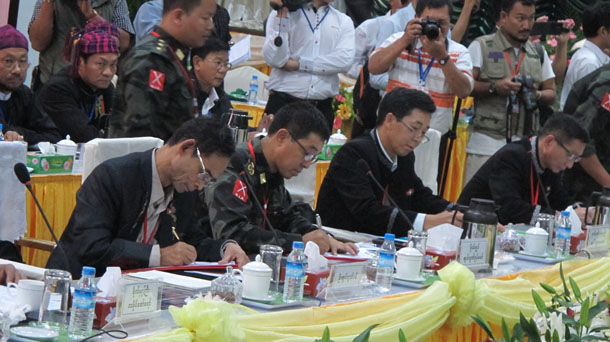NAYPYIDAW — The Myanmar Peace Center (MPC) says the government’s current agreement to de-escalate hostilities with the Kachin Independence Organization (KIO) is on the same level as a ceasefire.
“We have signed ceasefire agreements with 14 groups. Even though we have not signed a formal ceasefire agreement with the Kachin Independence Organization, or KIO, the agreements we have signed so far are far more comprehensive than the ones signed by the ceasefire groups,” MPC director Kyaw Yin Hlaing told a large forum of top-ranking government officials, foreign diplomats and international aid organizations in Naypyidaw on Monday. “So for many of us who are involved in the peace process, we sort of consider that we have achieved a sort of ceasefire agreement with that particular organization.
“The only group that has yet to sign the ceasefire agreement is the Palaung ethnic armed groups. But all ethnic groups, and the government—all parties are now working toward a nationwide ceasefire agreement.”
He was speaking at the Second Myanmar Development Cooperation Forum, a two-day event organized by the government to discuss ways of accelerating international development assistance to Burma in a number of areas, ranging from education to health care, infrastructure development and capacity building. After decades of armed conflict, the peace process has also received substantial international funding, and the MPC plays a major role, as a government-affiliated organization that brings together government and ethnic leaders for negotiations.
Echoing statements by the government over the past year, the MPC director said he expected a nationwide ceasefire agreement—which has been delayed a number of times—would soon be signed with all rebel groups, to consolidate individual ceasefire deals and allow for political dialogue. He said the government negotiation team and ethnic leaders had agreed on over 80 percent of issues in a draft of the proposed nationwide agreement. “The rest is just the small, nitty-gritty details, which I am sure we will manage to resolve,” he told the forum.
He cautioned that many obstacles remained, and noted that in addition to 16 major rebel groups, many more smaller groups would need to forge peace or ceasefire deals with the government. “We’re all working on that, and sooner or later we’ll get there. I’m pretty sure that sometime in the very near future, we will be able to sign the nationwide ceasefire agreement,” he said.
Since coming to office nearly three years ago, President Thein Sein’s government has signed individual ceasefire deals with most major ethnic armed groups, and it is now pushing for the nationwide ceasefire agreement. But conflicts with Kachin rebels in northern Burma since June 2011 have continued to taint the government’s track record of political and economic reforms. Peace talks in Kachin State last year did not yield a ceasefire deal, but the KIO and its armed group signed a seven-point agreement with the government negotiation team pledging to de-escalate hostilities.
Dau Kha, a spokesperson for the KIO technical advisory team in Kachin State, said the MPC was not overreaching by claiming that the seven-point agreement was as comprehensive as other individual ceasefire deals with rebel groups elsewhere.
“Even though we haven’t signed [a ceasefire], on the ground level we are cooperating with each other to reduce tensions,” he told The Irrawaddy in a phone interview on Tuesday, adding that he had not been present during the MPC director’s speech in Naypyidaw and could not comment conclusively.
He said some low-scale clashes had continued in Kachin State’s Bhamo District in recent weeks, and he noted the continuing movement of troops on the ground, but said the situation had largely calmed compared with fighting in late 2012 and early 2013.
“There is some military movement and some shows of force, but it’s not severe,” he said.
Along with other ethnic rebel groups from around the country, the KIO earlier this month said it intended to sign the nationwide ceasefire agreement in the future so long as political dialogue begins immediately during the signing conference.
The government’s negotiation team, led by President’s Office Minister Aung Min, has pushed the rebels to sign the agreement first and then prioritize political dialogue.
“Once we reach the nationwide ceasefire agreement, we will be working on the framework for political dialogue,” the MPC’s Kyaw Yin Hlaing told the forum on Monday. “Ethnic armed groups are really worried about political dialogue. They thought the government might stop at the ceasefire agreement, but President U Thein Sein and all senior government officials involved in the peace process have repeatedly mentioned that there will be political dialogue.”
He stressed the importance of trust-building by all stakeholders, and said the goal of national reconciliation would not be assimilation, but rather respect for the differences of ethnic groups.
Aung Min also spoke at the Myanmar Development Cooperation Forum, and emphasized the importance of dialogue as Burma builds a new political climate after decades of authoritarian rule.
“Since mistrust, divisions and suspicions have plagued our society in the past, we are unable to grab hold of the new political culture with confidence. But rather we are approaching this idea with caution,” he told the forum.
“Now is the time for us to address our political, economic and social issues by embracing this new political culture whose attributes are dialogue, debate, discussion and accommodation of divergent views.”
















